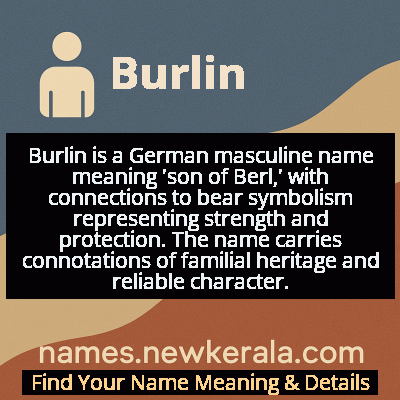Burlin Name Meaning & Details
Origin, Popularity, Numerology Analysis & Name Meaning of Burlin
Discover the origin, meaning, and cultural significance of the name BURLIN. Delve into its historical roots and explore the lasting impact it has had on communities and traditions.
Name
Burlin
Gender
Male
Origin
German
Lucky Number
4
Meaning of the Name - Burlin
Burlin is a German masculine name meaning 'son of Berl,' with connections to bear symbolism representing strength and protection. The name carries connotations of familial heritage and reliable character.
Burlin - Complete Numerology Analysis
Your Numerology Number
Based on Pythagorean Numerology System
Ruling Planet
Uranus (Rahu)
Positive Nature
Strong sense of order, loyal, practical, and disciplined.
Negative Traits
Stubborn, overly serious, rigid, and prone to feeling restricted.
Lucky Colours
Blue, gray.
Lucky Days
Saturday.
Lucky Stones
Blue sapphire.
Harmony Numbers
1, 7, 8.
Best Suited Professions
Managers, engineers, accountants, organizers.
What People Like About You
Dependability, discipline, practicality.
Famous People Named Burlin
Burlin Grier
American Football Player
Professional defensive back who played for the New York Giants and Philadelphia Eagles in the NFL
Burlin White
Educator and Administrator
Notable academic administrator who served as president of multiple educational institutions
Burlin Paulk
Basketball Coach
Successful college basketball coach known for developing young talent and building competitive programs
Name Variations & International Equivalents
Click on blue names to explore their detailed meanings. Gray names with will be available soon.
Cultural & Historical Significance
During the 18th and 19th centuries, as surnames became more formalized, Burlin transitioned from primarily a surname to occasionally being used as a given name, particularly among families wanting to honor ancestral lines while maintaining distinctive Germanic identity. The name carries echoes of rural Germanic life, where connection to nature and family lineage were deeply intertwined. In modern German-speaking regions, while uncommon as a first name, Burlin persists as a surname that continues to evoke these historical connections to family heritage and traditional values.
Extended Personality Analysis
Individuals named Burlin are often perceived as possessing a unique blend of strength and approachability, reflecting their 'little bear' etymology. They typically exhibit grounded, reliable personalities with a protective nature toward those they care about, much like the bear symbolism in their name's origin. Berlin's tend to be practical problem-solvers who approach challenges with quiet determination rather than flashy displays of ability. Their personality often combines traditional values with modern adaptability, making them both stable and flexible in various situations.
Many Berlin's display strong loyalty to family and close friends, embodying the familial connection inherent in the 'son of' meaning. They frequently possess an understated confidence that doesn't need constant validation, and their strength tends to emerge most noticeably when supporting others or facing adversity. This combination of protective instinct and reliable character makes them natural leaders in community and family contexts. While they may appear reserved initially, Berlin's often reveal deep emotional intelligence and thoughtful perspectives once trust is established, creating lasting relationships built on mutual respect and genuine care.
Modern Usage & Popularity
In contemporary times, Burlin remains a relatively uncommon given name, primarily used within families seeking to honor Germanic heritage or maintain family naming traditions. The name sees occasional usage in Germany, Austria, and among German diaspora communities in the United States and Canada. While not appearing on popular baby name charts, Burlin maintains a steady, though rare, presence that appeals to parents seeking distinctive yet traditionally-rooted names. Modern usage often treats Burlin as a masculine given name that bridges historical significance with contemporary sound, making it attractive to parents who value both uniqueness and cultural depth. The name has seen a slight resurgence in recent years as part of the broader trend toward reviving vintage and heritage names, though it remains well outside mainstream popularity.
Symbolic & Spiritual Meanings
Symbolically, Burlin represents the intersection of familial legacy and personal strength. The 'son of' component carries deep symbolic weight, connecting the individual to ancestral lines and generational continuity, while the bear symbolism evokes protection, wilderness wisdom, and quiet power. Metaphorically, the name suggests someone who carries forward family traditions while developing their own unique identity—the 'little' aspect implying growth potential and humility despite inherent strength. The combination creates a symbolic narrative of grounded leadership, where strength is exercised with responsibility and protection is offered with compassion. In broader symbolic terms, Burlin represents the idea that true power often lies in connection to one's roots and the quiet, consistent application of one's abilities rather than in overt dominance or aggression.

